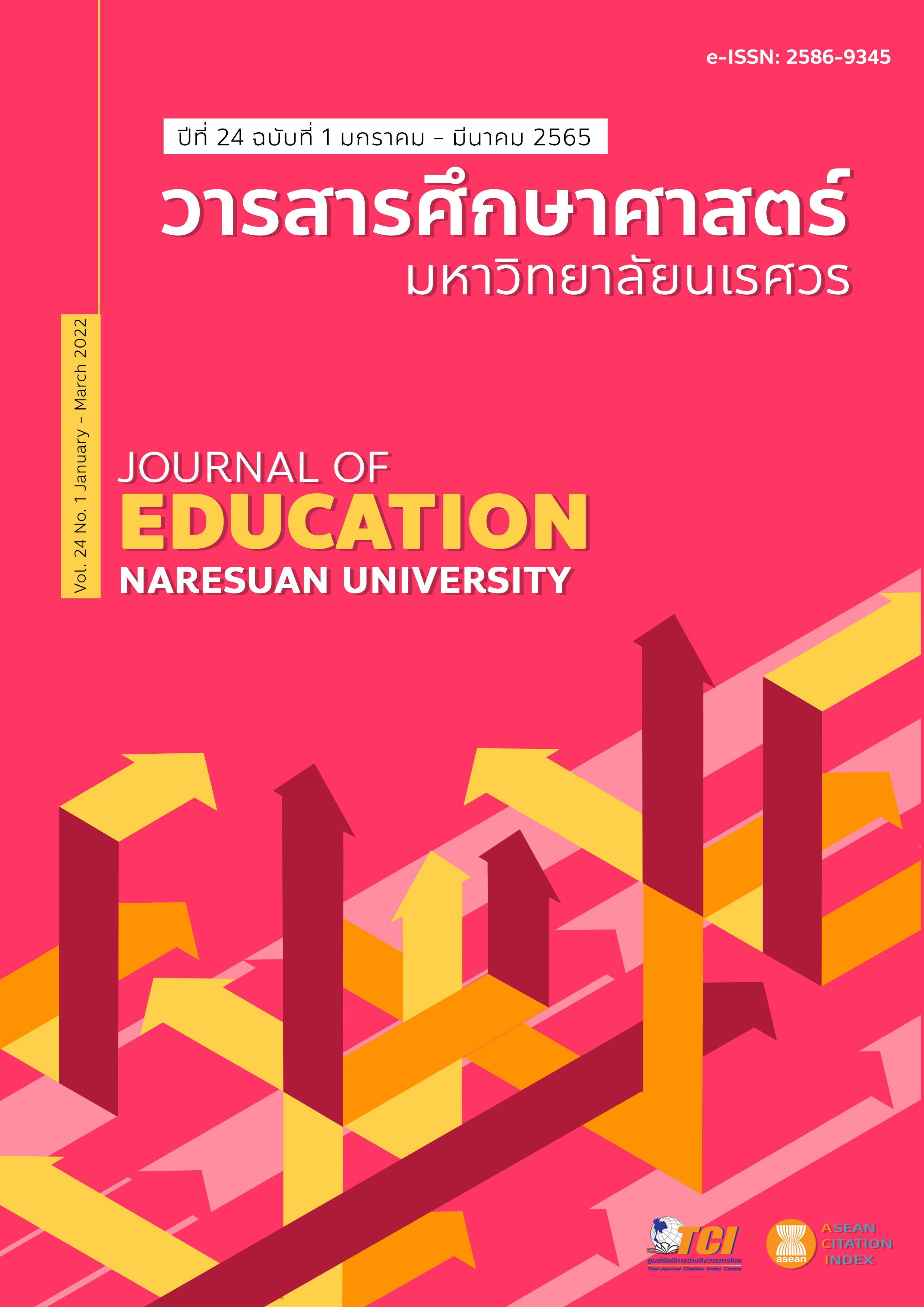THAI SCIENCE PRE-SERVICE TEACHERS’ IMPLEMENTATIONS OF STEM THROUGH A PHENOMENOLOGICAL MULTIPLE CASE STUDY AFTER EXPERIENCING BLENDED PROFESSIONAL DEVELOPMENT PROGRAM
Main Article Content
Abstract
Integration of STEM disciplines offers students an experience to learn in real-world, multidisciplinary contexts. Teachers play the key role in STEM education and it is important to attract high achievers with relevant backgrounds. To produce a generation interested and skilled in STEM one of the key factors are teams of teachers who work together in an integrated approach, based on cross- curricular teaching and learning. Therefore, this study draws upon classroom implementation though a team who supports the student teachers’ practice. Phenomenological multiple case study was used as the framework to understand 5 science teachers’ first-time experiences in implementing integrated STEM curricular units in their elementary and middle school science classrooms. Classroom implementation data and teacher reflective interviews were used to illustrate different degrees of integrated STEM instruction to understand the teachers’ challenges and successes with these varying approaches. The findings indicate that pre-service teachers have a strong understanding of STEM implementation after they were provided blended professional development and continual school coaching. The results of this study indicate that the knowledge they have acquired provides them with a broadened scope on how to teach STEM in schools now and what they need for future teaching of STEM. Pre-service teachers were challenged to make clear connections between science, engineering, and mathematics while simultaneously maintaining a motivating and engaging context for their students throughout their instruction. Therefore, educational researchers, policy makers, and STEM educators should focus to foster new teachers to reflect across content disciplines for the first time. Continual teacher support for the learning of STEM content and pedagogical practices for integration across content disciplines.
Article Details

This work is licensed under a Creative Commons Attribution-NonCommercial-NoDerivatives 4.0 International License.
The owner of the article does not copy or violate any of its copyright. If any copyright infringement occurs or prosecution, in any case, the Editorial Board is not involved in all the rights to the owner of the article to be performed.
References
Anne, T. E., & Kristina, M. T. (2017). Supporting integrated STEM in the elementary classroom: a professional development approach centered on an engineering design challenge. International Journal of STEM Education, 4(6), 1-16. DOI: 10.1186/s40594-017-0058-3
Bybee, R. W. (2010). Advancing STEM Education A 2020 Vision. Technology and Engineering Teacher, 70, 30-35.
Corbin, J. M, & Strauss, A. L (2008). Basics of qualitative research: Techniques and procedures for developing grounded theory. Thousand Oaks: SAGE.
Creswell, J. W. (2013). Qualitative inquiry and research design Choosing among give approaches. Thousand Oaks: SAGE.
Crotty, E. A., Guzey, S. S., Roehrig, G. H., Glancy, A. W., Ring-Whalen, E. A., & Moore, T. J. (2017). Approaches to integrating engineering in STEM units and student achievement gains. Journal of Pre-College Engineering Education Research, 7(2), 1–14.
Cunningham, C. M., & Lachapelle, C. P. (2014). Designing engineering experiences to engage all students. In S. Purzer, J. Strobel, & M. Cardella (Eds.), Engineering in pre-college settings: synthesizing research, policy, and practices (pp. 117–142). Lafayette: Purdue University Press.
Dare, E. A, Ellis, J. A., & Roehrig, G. H. (2014). Driven by beliefs: Understanding challenges physical science teachers face when integrating engineering and physics. Journal of Pre-College Engineering Education Research, 4(2), 47–61.
Estapa, A., Pinnow, R. J., & Chval, K. B. (2016). Video as a professional development tool to support novice teachers as they learn to teach English language learners. The New Educator, 12(1), 85–104.
Guzey, S. S., Tank, K. M., Wang, H. H., Roehrig, G., & Moore, T. J. (2014). A high-quality professional development for teachers of grades 3–6 for implementing engineering into classrooms. School Science and Mathematics, 114(3), 139–149. doi:10.1111/ssm.12061.
Guzey, S. S., Moore, T. J., & Harwell, M. (2016). Building up STEM: An analysis of teacher-developed engineering design-based STEM integration curricular materials. Journal of Pre-College Engineering Education Research, 6(1), 1–19.
Holmlund, T., Lesseig, K., & Slavit, D. (2018). Making sense of “STEM education” in K-12. International Journal of STEM Education, 5(32), 12.
The Institute for the Promotion of Teaching Science and Technology (IPST). (2013). STEM Education Thailand and STEM Ambassadors), IPST Journal, 42(185), 14-18.
Kelley, T. R., & Knowles, J. G. (2016). A conceptual framework for integrated STEM education. International Journal of STEM Education, 3(11), 2–11.
Leung, A. (2018). Exploring STEM pedagogy in the mathematics classroom: a tool-based experiment lesson on estimation. International Journal of Science and Mathematics Education. https://doi.org/10.1007/s10763-018-9924-9.
Mishra, P., & Koehler, M. J. (2006). Technological pedagogical content knowledge: A framework for integrating technology in teachers’ knowledge. Teachers College Record, 108(6), 1017–1054.
Moore, T. J., Guzey, S. S., & Brown, A. (2014). Greenhouse design to increase habitable land: An engineering unit. Science Scope, 37(7), 51–57.
Moore, T. J., Stohlmann, M. S., Wang, H. H., Tank, K. M., Glancy, A. W., & Roehrig, G. H. (2014). Implementation and integration of engineering in K-12 STEM education. In S. Purzer, J. Strobel, & M. Cardella (Eds.), Engineering in precollege settings: Synthesizing Research, Policy, and Practices. Lafayette: Purdue University Press.
National Research Council. (2014). STEM integration in K-12 education: Status, prospects, and an agenda for research. Washington: National Academies Press.
Organization for Economic Co-operation and Development. (2016), Education in Thailand: An OECD - UNESCO Perspective, Reviews of National Policies for Education. Paris: OECD Publishing.
Organization for Economic Co-operation and Development. (2018). The future of education and skills: Education 2030. Retrieved August 2, 2018, from https://www.oecd.org/education/2030/E2030%20Position%20Paper%20(05.04.2018).pdf
Roehrig, G. H., Moore, T. J., Wang, H. H., & Park, M. S. (2012). Is Adding the E Enough? Investigating the impact of K-12 engineering standard on the implementation of STEM Integration. School Science and Mathematics, 112(1), 31–44.


